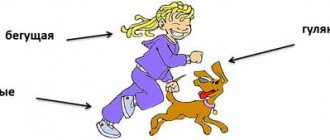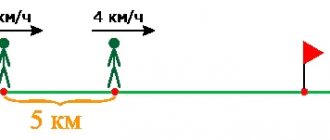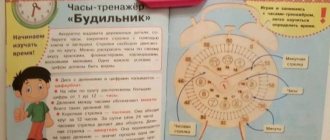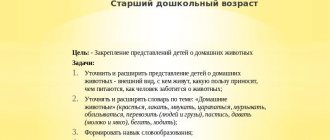Summary of a lesson in the Russian language on the topic “Real participles of the past tense”
Lesson topic:
"Active past participles"
Tasks:
educational:
- introduce students to the formation of active past participles;
- developing the ability to find participles and determine its grammatical features;
- teach how to choose a vowel in the suffixes of these participles; develop punctuation skills;
— develop skills in spelling suffixes and endings of participles; skills of isolating participial phrases.
developing:
- develop spelling vigilance;
— intensify cognitive activity in Russian language lessons;
— develop communication and information competencies;
— to reveal the creative potential of students.
educational:
— create positive motivation among students for Russian language lessons by involving everyone in active activities;
- develop mental operations, cognitive activity;
- cultivate a culture of speech, love for words, native language;
- cultivate attention and kind attitude towards each other;
— develop an interest in knowledge, a sense of responsibility for the results of one’s work, and a culture of communication.
Equipment:
Blackboard, textbooks, notebooks, cards, tasks for working in pairs, Ozhegov’s explanatory dictionary, textbook “Russian language” 7th grade, M.T. Baranov, T.A. Ladyzhenskaya.
During the classes
1.Organizational moment
Teacher: Good morning, guys! I am very glad to meet you! Give each other a smile. I hope that you are in a good mood and that we will work very friendly and actively today. I don't even doubt this.
2. Repetition of learned material
($16 page 42)
Teacher: Guys, before starting a new topic, I would like to repeat the material you studied from the last lesson.
2.1 “Participial phrase. Isolation of participial phrase"
Teacher: Parse the sentences, place punctuation marks, highlight participial phrases. Working with cards. Students perform analysis in notebooks, one student works at the blackboard.
Sample sentences:
1) There was a downpour outside, accompanied by peals of thunder and terrible pictures.
2) Today I saw a cute kitten lapping milk right from the ground.
3) Speech that reflects meaning
, - correct speech.
4) Either we speak, then we force the person who says sensible things
, talk nonsense.
5) Living in the south
birds come to us very often.
"Vowels in present active participles"
Teacher: What is a communion?
Answer:
A participle is an independent part of speech that denotes a characteristic of an object that manifests itself in time by action.
Teacher: What questions does it answer?
Answer:
The sacrament answers the questions: which one? which? which? which?
Teacher: What parts of speech does the participle combine?
Answer:
The participle has the characteristics of a verb and an adjective.
Teacher: What is a participle in a sentence?
Answer:
In sentences, participles are usually modifiers, less often predicates.
Teacher: How are active present participles formed?
Answer:
In the suffixes of the active participles of the present tense -ush- (-yush-) and -ash- (-yash-).
Teacher: When is the letter U or Yu written in the suffixes of active participles?
Answer:
The letter U or Yu is written if the participle is formed from a verb
of the I conjugation.
Teacher: When is the letter A or Z written in the suffixes of active participles?
Answer:
The letter A or Z is written if the participle is formed from a verb
of the second conjugation.
2.2 Task with words.
Teacher: Form active present participles from these verbs. Name the verb conjugation.
Write on the board:
Fight, play, pull, love, sing, heal, whisper, build
Answer:
Fight,
I resp. - struggling ; play, I resp. – playing ; pull, I ref. – chan ush ; love, II reference - any box ; sing, I ref. - yush ; treat, II reference – healing ; whisper, I sp. - whispering ; build, II reference-building box .
Conclusion:
In the suffixes of the real participles of the present tense
-ush- (-yush-)
and -
ash- (-yash-)
the following is written: 1) the letter
y
or
yu
, if the participle is formed from a verb of the first conjugation;
2) letter a
or
i
, if the participle is formed from a verb of II conjugation.
3. Introduction of new material. Work on the topic: “Real participles of the past tense.”
($17, page 45)
3.1 Conversation using the table on page 45 from the textbook “Russian language”, grade 7. (M.T. Baranov, T.A. Ladyzhenskaya).
3.2 Reading theoretical material on page 46 from the textbook “Russian language”, grade 7 (M.T. Baranov, T.A. Ladyzhenskaya).
RULE!!!
Active past participles are formed from the bases of the indefinite form of transitive and intransitive verbs of the perfect and imperfect forms using the suffixes -вш-, -ш-. The suffix -вш- is added to stems that end in a vowel, and the suffix -ш- is added to stems that end in a consonant.
3.3 Teacher: Guys, open page 45, pay attention to the table again and answer the questions:
1. Are active past participles formed from transitive or intransitive verbs?
Answer:
Active past participles are formed from the bases of the indefinite form of transitive and intransitive verbs of the perfect and imperfect forms using the suffixes -вш-, -ш-.
2.What suffixes are used to form active past participles?
Answer:
Using the suffixes -вш-, -ш-.
3. In what case is the suffix –vsh-, -sh- written?
Answer:
The suffix -вш- is added to stems that end in a vowel, and the suffix -ш- is added to stems that end in a consonant.
4.
Physical education minute.
Teacher: Stand up, guys. We will conduct thematic physical education. Your task is to select from the named works titles of works containing participles and titles containing adjectives. If the name contains an adjective, you must clap once, and if there is a participle, raise both hands up.
“Vasilisa the Beautiful” (cotton).
“The Sleeping Princess” by Zhukovsky (up).
“The Bronze Horseman” by Pushkin (cotton).
"Talking Bundle" Darrell (up).
“French Lessons” Rasputin (cotton)
Teacher: So, your knowledge has been tested, rest a little. Go ahead.
5.
Consolidation of the studied material.
5.1 Write down the active past participles. Indicate the suffix of the participles. (Write on the board.)
See, sow, smile, hate, carry, attract, fade, arrive, extinguish, burn.
Answer:
See - saw the lice , sow - sow the lice, hate - hate the lice - attracted , attracted - attracted , wither - withered , arrive - arrived - lice , extinguish - extinguish the lice , burn - lice burn .
5.2 Performing exercise 96, p.46 (see Appendix No. 1)
Assignment: distribute the phrases into two groups: with active present participles - in one group, with active past participles - in another. With any two phrases, make sentences with homogeneous members. Indicate the suffixes of the participles.
5.3 Teacher: Find the past participles in the sentences and underline them. Name the verbs from which they are formed. Students complete the task in notebooks, one by one, at the board. Highlight the suffixes of the participles; vowel before the suffix.
See - you will see the lice
ii, sow - sowing
louse
, smile - smile
louse
, hate - hate
louse
, carry - bore,
attract
attracted
,
wither withered,
arrive
- arrived , extinguish - extinguish
louse
, burn - burnt
lice
, touch - touch
lice
.
Conclusion:
Before the participle suffix, the same vowel is written as in the infinitive form of the verb.
6. Independent work on options followed by mutual verification.
Option 1 writes active present participles,
2nd - active past participles.
The old trees have fallen off long ago, and only the young ones retain their withered yellowish leaves, shining with gold. Evergreen spruce and pine trees, as if rejuvenated, stand out brightly through the reddish network of birch branches.
7.
Homework.
Teacher: Repeat $17, learn the rules! From fiction, write down 5 sentences with a participial phrase (participle - active, past tense), parse one sentence syntactically.
8.
Lesson summary.
- What was easy?
-What was difficult?
-What was unclear?
- What did you like?
Thank you for the lesson!





